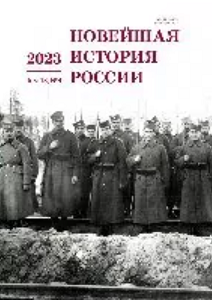The Leningrad Blockade through the Lens of Historical Sociology and Social History
The Leningrad Blockade through the Lens of Historical Sociology and Social History
Author(s): David BrandenbergerSubject(s): Sociology, Military history, Political history, Social Theory, History of Communism, Book-Review
Published by: Издательство Исторического факультета СПбГУ
Keywords: Blockade; Leningrad; World War II; survival; institutions; culture; power; resilience; social theory;
Summary/Abstract: Jeffrey Hass’ study of the 872-day blockade of Leningrad is groundbreaking interdisciplinary research, weaving together history, sociology, economics and behavioral psychology to explore how individual Leningraders survived the siege’s inhumane conditions and why society in the northern capital didn’t collapse. He examines how the blockade challenged notions of gender and class identity and at the same time reified them, reinforcing traditional patterns and behaviors. Hass focuses on the siege of Leningrad, which was probably the most sustained experience of urban hardship, suffering and starvation in World War II. He is aware that his findings may not necessarily apply to other contexts in World War II or beyond, and instead investigates larger questions about systemic collapse, such as what determines when communities, institutions or civilizations break down and the sources of resilience that allow society to survive extreme hardship. The disciplinary perspective of the book is historical sociology, which is an empirical study of society in the past. There has been tension between social history and historical sociology, with the former emphasizing the sociocultural context of separate and distinct events and actors, and the latter stressing more generalizable theory. Social historians focus on the distinctiveness of historical experience and phenomena, while historical sociologists investigate these topics in ways governed by their relevance to broader conceptual areas of scholarship. Historical sociology offers a deductive approach, identifying evidence capable of supporting or refuting theoretical propositions, while social history suggests an inductive methodology, attempting to make broader sense of disparate historical data. These differences have been discussed by well-known critics such as Eric Hobsbawm, who argued that historical sociology’s focus on generalizable patterns and behaviors rendered it mechanistic. Hass’s book, as a premier example of modern historical sociology, is careful enough to deflect many of these traditional criticisms of the field.
Journal: Новейшая история России
- Issue Year: 13/2023
- Issue No: 45
- Page Range: 813-818
- Page Count: 6
- Language: English

